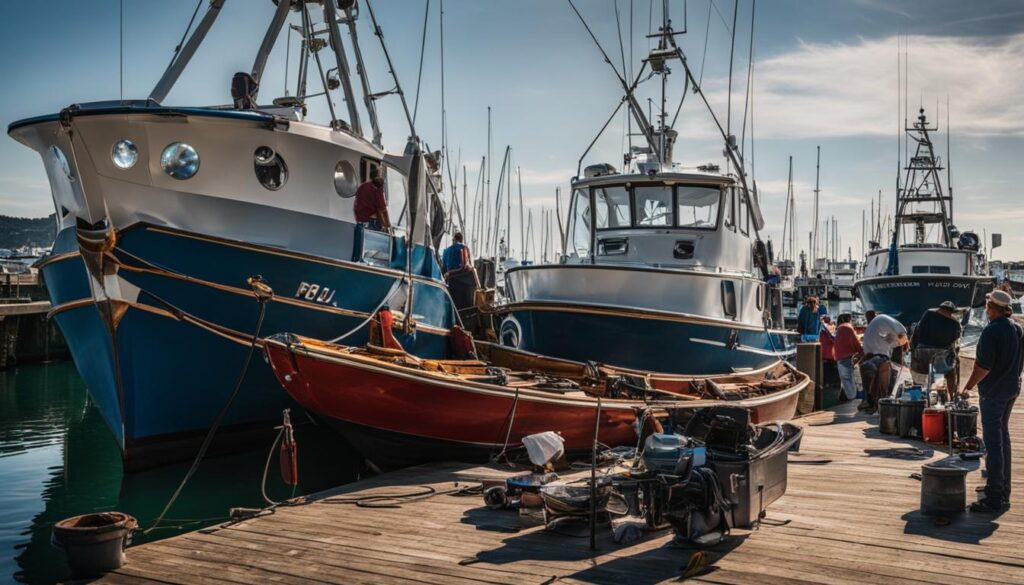We may earn money or products from the companies mentioned in this post.
If you are an avid fishing enthusiast, you understand the importance of keeping your fishing boat in top condition. Regularly maintaining your boat is crucial to prolong its life, improve its performance, and ensure your safety and enjoyment on the water.
In this comprehensive guide, we will provide you with expert tips and techniques to maintain your fishing boat. We will cover everything from cleaning and inspection to creating an effective boat maintenance schedule. By following these maintenance practices, you can ensure your boat stays ship-shape and ready for your next fishing adventure.
Key Takeaways:
- Maintaining your fishing boat is essential for longevity and performance.
- Boat maintenance includes cleaning, inspection, and replacement of essential parts.
- A boat maintenance schedule is necessary to prevent unforeseen problems and prolong boat life.
- Regular maintenance ensures a safe and enjoyable fishing experience.
- Refer back to this guide for a boat maintenance checklist and expert advice.
Understanding the Importance of Fishing Boat Maintenance
Proper Fishing Boat Maintenance is essential for the longevity and peak performance of your boat. Neglecting maintenance can result in costly repairs, decreased efficiency, and safety hazards. Here are the top reasons why you should prioritize fishing boat care:
- Preservation of Investment: Investing time and effort into boat maintenance ensures that your boat stays in good condition, preserving its value over time. A well-maintained boat can also increase its resale value.
- Enhanced Performance: Regular maintenance ensures your boat runs efficiently, reducing fuel consumption and improving overall performance on the water.
- Safety: Proper maintenance is crucial to ensure safe operation of your fishing boat. Issues like a faulty engine or electrical system can result in accidents or injuries on the water.
- Compliance with Regulations: Boat owners are required to comply with safety regulations set by the US Coast Guard, and regular maintenance ensures compliance with these requirements.
Now that we understand why maintenance is vital let’s look at essential boat cleaning practices in the next section.
Boat Cleaning: A Vital Part of Maintenance
Cleaning your fishing boat is a crucial aspect of its overall maintenance. A dirty boat not only looks unsightly but can also lead to more significant issues, such as corrosion, waterline stains, and damage to the paintwork and upholstery. By regularly cleaning your fishing boat, you can maintain its appearance, prevent corrosion, and enhance its performance.
To help you get started on boat cleaning, we have created a comprehensive boat cleaning guide. Here are the steps you need to follow:
| Step | Description |
|---|---|
| 1 | Gather the necessary equipment, including brushes, sponges, buckets, cleaning agents, and a hose or pressure washer. |
| 2 | Remove all debris and loose items from your boat and rinse it with water. |
| 3 | Apply a boat cleaning solution to the hull, deck, and other surfaces of your boat. Use a soft brush or sponge to scrub all areas thoroughly. |
| 4 | Rinse your boat with water to remove all traces of the cleaning solution. Use a pressure washer or hose if necessary. |
| 5 | Use a wax or polish to protect your boat’s surfaces and enhance its shine. Apply the wax or polish with a soft cloth, working in small sections at a time. |
| 6 | Clean the windows and other glass surfaces with a glass cleaner and a soft cloth. |
| 7 | Finally, clean the upholstery and carpets with an appropriate cleaning solution. Use a soft brush or sponge to clean all surfaces thoroughly. |
By following this boat cleaning guide, you can keep your fishing boat clean and in top condition. Remember to clean your boat after every use, especially if you fish in saltwater or contaminated waterways.
Essential Boat Maintenance Tips
Maintaining your fishing boat is essential to ensure its longevity, performance, and safety. In this section, we will cover some essential boat maintenance tips that every fishing boat owner must follow. Performing these tasks regularly can save you from costly repairs and ensure that your boat stays in top condition.
1. Conduct Regular Inspections
Regular inspections are crucial to ensure that your boat’s hull, engine, and electrical systems are in good condition. Experts recommend that you inspect your boat before every trip, or at least once a month if you don’t use your boat frequently. During inspections, check for any signs of wear and tear, leaks, or corrosion. Inspect the fuel lines, belts, hoses, and clamps for any cracks or damage.
To make it easier, create a boat maintenance checklist that includes all the items that require inspection. Use this checklist to ensure that you do not miss anything during the inspection.
2. Change Oil Regularly
Changing your boat’s oil regularly is essential for its performance and longevity. Experts recommend changing the oil every 50 to 100 hours of operation or at least once a year, even if you have not reached this milestone. Old oil can cause damage to the engine and can lead to overheating, which can cause serious problems.
Refer to your boat’s owner’s manual to determine the recommended oil type and schedule for oil changes. Ensure that you dispose of the used oil properly as it can be hazardous to the environment.
3. Keep the Boat Clean
Keeping your boat clean is crucial for its overall maintenance. Regular washing and waxing can prevent corrosion and maintain its appearance. Always clean your boat after use and remove any dirt or debris from the deck and hull.
Use a boat cleaning guide to ensure that you use the right products and techniques to clean your boat effectively. Also, ensure that you clean the boat’s interior, which includes the seats, carpets, and storage compartments.
4. Check the Electrical Systems
The electrical systems of your boat are critical for its safety and performance. Check the battery, wiring, and electrical connections regularly to ensure they are in good condition. Inspect the battery terminals for any signs of corrosion and replace them if necessary. Check the wiring for any frayed or damaged wires and replace them if required.
It is also essential to test the electrical systems regularly to ensure they are working correctly. Refer to your boat’s owner’s manual to determine the testing procedures and recommended schedule for testing.
5. Replace Essential Parts
Replacing essential parts is essential to ensure the safety and performance of your fishing boat. Replace parts like propellers, spark plugs, and filters regularly to ensure they are in good condition. Inspect the parts before replacement to determine if they need replacement or not.
Refer to your boat’s owner’s manual to determine the recommended replacement schedule for essential parts. Also, ensure that you use the right parts and follow the correct replacement procedures.
Creating an Effective Boat Maintenance Schedule:
Maintaining a regular boat maintenance schedule is crucial to ensure your fishing boat operates smoothly and without any unforeseen problems. It also helps in preventing major issues and prolongs the life of your boat. There are several factors to consider when creating a boat maintenance schedule, including your boat’s usage and the manufacturer’s recommendations.
- Start by reviewing your boat’s manual: The manufacturer’s recommendations provide valuable insights into the necessary maintenance tasks for your boat. The manual should have a maintenance checklist to follow, as well as a recommended schedule for each task. Ensure that you understand and follow the manufacturer’s recommendations.
- Assess your boat’s usage: Consider how often you use your boat and for what purpose. A boat that is frequently used in saltwater will require more cleaning and maintenance than a boat used in freshwater.
- Create a checklist of maintenance tasks: Based on the manufacturer’s recommendations and your boat’s usage, create a checklist of maintenance tasks that you should conduct. This checklist should include daily, weekly, monthly, and annual tasks.
- Set a schedule: Once you have a checklist of maintenance tasks, set a schedule for each task. Ensure that you schedule tasks based on priority and frequency.
- Stick to the schedule: Creating a maintenance schedule is not enough; you need to follow it consistently. Create reminders for each task to ensure that you don’t miss anything. You can use your phone, a calendar, or other reminder tools to help you stick to the schedule.
In conclusion, creating a boat maintenance schedule is crucial to ensuring that your fishing boat stays in top condition. By following a schedule, you can stay on top of maintenance tasks and avoid any unforeseen problems. Use the manufacturer’s recommendations, assess your boat’s usage, create a checklist of maintenance tasks, set a schedule, and stick to it. With proper maintenance, your fishing boat will last longer and provide you with many memorable fishing trips.
Expert Advice on Fishing Boat Maintenance
When it comes to fishing boat maintenance, experts in the industry have a wealth of knowledge and experience to share. Here are some tips and insights from fishing boat owners and professionals:
“Regular maintenance is vital to ensure your boat stays in good condition. Make sure to check the propeller, steering, and electrical systems, and keep an eye out for any leaks or damage to the hull.”
– John, Fishing Boat Owner
John’s advice underlines the importance of regular boat maintenance checks. By staying on top of any issues, you can prevent more significant problems from arising.
“Always follow the manufacturer’s guidelines for maintenance and care. Use the recommended products and techniques, and don’t cut corners. It will save you money and extend the life of your boat.”
– Sarah, Boat Maintenance Professional
Sarah’s advice highlights the importance of following the manufacturer’s guidelines for maintenance. They will provide you with the best practices for your specific boat model, ensuring optimal performance and longevity.
Other expert tips to consider include:
- Invest in quality tools and products for boat maintenance.
- Don’t forget to check the battery and charging system regularly.
- Pay attention to your boat’s fuel system and filters.
- Keep your boat covered or stored in a protected area when not in use.
By following expert advice and staying on top of regular maintenance checks, you can ensure your fishing boat remains in top condition for years to come.
Conclusion
In conclusion, following a proper maintenance regime is vital to ensure the longevity and optimal performance of your fishing boat. By implementing the boat maintenance essentials outlined in this boat maintenance guide, you can keep your vessel in top-notch condition and enjoy memorable and safe fishing adventures.
Remember, regular maintenance tasks such as boat cleaning, engine and hull inspections, and electrical system checks are essential to mitigate unforeseen problems and keep your boat running smoothly. Always refer to the boat maintenance checklist provided in this guide for easy reference.
Expert Fishing Boat Maintenance Tips
For additional expert advice on boat maintenance tips, we recommend consulting experienced fishing boat owners and professionals in the industry. Their insights can provide you with valuable tips and techniques to overcome common challenges and keep your fishing boat in optimal condition.
Thank you for reading this comprehensive fishing boat maintenance guide. We hope this guide has helped you understand the importance of regular maintenance and provided you with the essential boat maintenance tips required to keep your fishing boat ship-shape.
FAQ
Why is regular boat maintenance important?
Regular boat maintenance is important to prolong the life of your fishing boat and ensure its peak performance on the water. It helps prevent major issues, maintains the boat’s appearance, and enhances its overall safety and reliability.
What are the essential tasks in boat maintenance?
Essential boat maintenance tasks include inspecting the hull and engine, checking electrical systems, replacing essential parts, cleaning the boat, and following a regular maintenance schedule. These tasks help keep your boat in top condition and prevent any potential problems.
How often should I clean my fishing boat?
It is recommended to clean your fishing boat after every use. Regular cleaning helps prevent corrosion, removes dirt and debris, and keeps your boat looking great. Additionally, thorough cleaning should be done at least once a year to maintain the boat’s overall condition.
How do I create an effective boat maintenance schedule?
To create an effective boat maintenance schedule, consider your boat’s usage and the manufacturer’s recommendations. Identify tasks that need to be done daily, monthly, and annually, and create a calendar or checklist to keep track of them. Regularly reviewing and updating the schedule will help you stay on top of maintenance tasks.
Can you provide any expert advice on fishing boat maintenance?
Yes! In our guide, we have gathered expert advice from experienced fishing boat owners and professionals in the industry. Their insights and tips will help you navigate common maintenance challenges and provide you with additional recommendations to keep your fishing boat in optimal condition.
Affiliate Disclosure: This post may contain affiliate links. If you purchase through our link, we may receive a small commission, but at no additional cost to you. For more information, please see our Disclosure statement.



